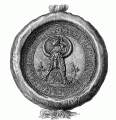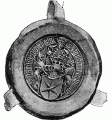baron, treasurer, ban, voivode, geréb, despot, deputy ispán (bailiff)
| |
| |
| |
| |
|
During the Middle Ages in Hungary baron was the highest honorary title in the country. Originally the county ispáns [bailiffs], and in the broader sense of the word, bishops also fell into this category. Starting from the reign of Louis the Great only the palatine, the Transylvanian voivode, the country judge, the bans of Slavonia, Dalmatia-Croatia, Macsó, Szörény, the royal treasurer, doorkeeper, protocol chiefs and stud-groom, and the ispáns [bailiffs] of Pozsony and Temes (from the middle of the 15th century) were included. The honours were presented by the king for a determined period (as the king wished). They could not be passed down, but from the 15th century the name (baron) became inheritable. Barons were different from simple noblemen, since a baron joined the war at the lead of his own bandery, and the oath of a baron was worth the oaths of ten noblemen, but 100 noblemen had to take an oath against a baron, and his widow was entitled to receive a compensation of 100 marks.
IT
treasurer
From the 14th century he was the most important financial office-holder in Hungary. The honour appeared during the reign of Charles I, as the subordinate of the treasurer, who was responsible for financial matters, and from 1377 as an independent honour. Since the royal chamber was not a unified organisation until Matthias Hunyadi's reforms, individual chambers did not depend on him. Money minting, precious metal mining, customs duties, salt matters, taxes and the debts of the ruler all came under his authority. After 1377 the office-holder was called baron, but he did not belong to the "real barons" of the country.
IT
ban (German Bann = power, ban)
Office-holders leading ban districts, had their separate governments situated at the southern border of medieval Hungary. Bans also fell into the category of barons. The honour of the ban originated from the independent Croatian kingdom, there - just as in Hungary - the bans were appointed by the king. On their territory they wielded military, juridicial and governing power in the name of the king. They even had the right to collect taxes. From the middle of the 13th century Slavonian bans minted money for a century in the name of the king, and they also appointed county ispáns [bailiffs]. The first Hungarian ban appeared in the 12th century as the leader of the Dalmatian-Croatian territories. They were often ispáns of the neighbouring Hungarian counties at the same time. Real barons, Macsó and Szörény were the bans of Slavonia and Dalmatia-Croatia - two honours which were finally merged in 1476. But the ban of Bulgaria (this honour existed only for a couple of years) also fell into this category. In contrast to this, the bans of Jajca, Szrebernik, Nándorfehérvár and Croatia, who were appointed in the second half of the 15th century, were just simple military commanders. The honour was sometimes held by two persons at the same time in the 14th-15th centuries, their deputies being known as deputy bans.
IT
voivode (Slav vojevod = military commander)
The voivode was the most important honour in Transylvania. His power extended to the county of Szolnok, which was unified at the time. He held the title of the ispán [bailiff] of Szolnok until 1426, but in Transylvania he wielded power over the seven castle districts. The Saxons and the Székelys did not come under his authority until the second half of the 15th century, but from 1461 the honours of voivode and the Székely ispán were merged. The voivode had military, juridicial and administrative power. Voivodes were appointed by the king -or if Transylvania was under the rule of the princes or the younger king, then they appointed the voivodes - from among non-Transylvanian families in most of the cases. The deputy of the voivode was appointed from among the familiares of the voivode.
IT
geréb (German Gräve, Graf = ispán [bailiff])
The leader of a settlement among the Transylvanian Saxons. In their families the right to pass judgement was inherited; later they assimilated with the category of court knights. In the 14th-15th centuries the majority of them moved away from the Saxon lands and assimilated with the Hungarian nobility.
IT
despot (Greek 'despotes' = lord)
In Byzantine court hierarchy this title was first presented to Prince Béla, then to the Hungarian king Béla III. From 1402-1453 it was the title of Serbian rulers, but after the fall of Serbia the title was held by the descendants of the Serbian ruling family living in Hungary.
IT
deputy ispán [bailiff]
The deputy of the county ispán [bailiff], and also the familiare of the ispán. Usually he presided over the sedria, when the ispán was away. The number of deputy ispáns was not defined, in one county there was one or two, but sometimes there could be more. Only the 1486 law obliged the ispáns to select an honourary nobleman from the county to assist them as deputy ispáns. In the Middle Ages the bearer of this honour was not selected from the 'bottom' by the noblemen of the county, but was rather appointed from 'above'.
IT




